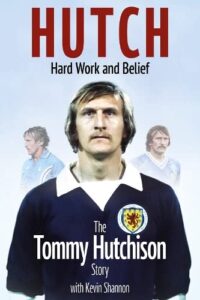 Old school.
Old school.
If it is not tattooed on the inside of his eyelids, I have a heavy fancy it shall be on his gravestone.
Tommy Hutchison is old school. Given the subtitle of his book – Hard Work and Belief – it could be very little else. This is a biography grown out of love and that drips from every syllable on the pages. It has heart and it has soul. And the fact that in a modern world, we can often dismiss the values and views of those who have lived a life is dispelled in the final few chapters as former Scottish international and current Coventry City legend Hutchison, is shown to be a guy who wants to give back to the community in a way that many who are “old school” are believed to be incapable.
Starting from the Raws in Fife where his hard-working family brought Tommy up, this is exactly the type of rags to fame story which Scottish football does so well – the big three Shankly, Busby and Stein come to mind. But it is a lot more than that. The surprise, by the end of the book, is that this has not been ghost written by a journalist but by a fan. It’s what might be described as a vanity project but the one quality missing from the entire enterprise is vanity.
Of course, this means that much of the narrative is unchallenged, that it lacks some of the critical poise that a seasoned journalist may bring and there is a lack, at times, of the perspective of others when facts are presented as fact, but it is a tremendous read. That lack of context can be difficult as you are reading through a story which is not anchored in the events of its time. You can forget what else was happening in the world and without a journalistic attention to the detail much can be left unchallenged, however, this is a modest subject matter not given to hyperbole or boastfulness; they would never allow him away with oany o that in Dundonald efter aw.
And so, we begin in Fife, a kingdom not without its troubles but it certainly had quite a few hearts – though none of them lost to any in Midlothian. In the beauty of Dundonald a boy was born who was rubbish at football at school. That he became a Scottish international is one for the cliché comics but for us it is a revelation Hutchison uses in his teaching of other kids like himself as much as to show us all what such hard work and belief can bring. It was christened in the actions of his upbringing where the chimney sweep gets an honourable mention as much as does his father and mother. This is a boy who was gratefully raised by a village and of course we have the there was no… crime, anti-social behaviour etc tropes of the past and we were poor, but it was idyllic, until you read of his father’s troubles as a miner. His illness led to poverty and yes it was different then, but poverty is poverty. Hutchison may have struggled with the cost of a boot, but he never had his heart taken from him by a lack of support.
That schooling was not to be his master is a common enough theme for those whose intelligence is to be found at the end of your legs, but Hutchison does not forswear the needs of education. He trained and became a painter and decorator out of necessity – football was not a full time occupation for someone who started in the Juniors – and from the Bluebells, he went on an odyssey which is rich in experience and full of anecdotes. It is a rich tapestry which includes the “luck” of broken legs with the Wasps, the vagaries of managerial change at the seaside, the joys of promotion – premature or otherwise, the despair of relegation, working with legendary figures of the game like Bob Stokoe, a fairly unique barter system of ticket trading to make ends meet, and all of this, before he entered the field of play in a Scotland shirt.
Of course, there are many characters named along the way including one John Burridge who must have been very young when he appeared in Hutch’s career, as he appeared in a charity game in Edinburgh in the latter part of 2022 in his seventies!
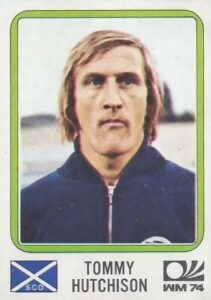 Hutch’s transfer to Coventry City and elevation to the First Division meant he was in the shop window for the Scottish selectors. That is when I, as a young spectator became aware of him – the 1974 World Cup. It was the first World Cup of which I was aware. Scotland’s manager, Willie Ormond has always been cast as the gentile figure, not seen by many as a giant of the Scottish game despite being the only Scottish manager to get us to a World Cup and come home unbeaten – although still, by Tommy Docherty’s standards, home before the postcards. I read these chapters with great interest. The names around Hutch’s debut are legends themselves, McGrain, Dalglish, Jordan, Hay, the Lawman… But it is the detail both of the campaign to get to the World Cup and whilst they were there that was of huge interest. Penny pinching blazers who put an international squad up in a halls of residence for a World Cup final friendly, cockeyed commercial deals, a wholly forgettable World Cup song, and being unable to deal with recalcitrant rowers as well as one man who saw his stature greater than his height – Billy Bremner – are all included, and I devoured them with eyes wide open.
Hutch’s transfer to Coventry City and elevation to the First Division meant he was in the shop window for the Scottish selectors. That is when I, as a young spectator became aware of him – the 1974 World Cup. It was the first World Cup of which I was aware. Scotland’s manager, Willie Ormond has always been cast as the gentile figure, not seen by many as a giant of the Scottish game despite being the only Scottish manager to get us to a World Cup and come home unbeaten – although still, by Tommy Docherty’s standards, home before the postcards. I read these chapters with great interest. The names around Hutch’s debut are legends themselves, McGrain, Dalglish, Jordan, Hay, the Lawman… But it is the detail both of the campaign to get to the World Cup and whilst they were there that was of huge interest. Penny pinching blazers who put an international squad up in a halls of residence for a World Cup final friendly, cockeyed commercial deals, a wholly forgettable World Cup song, and being unable to deal with recalcitrant rowers as well as one man who saw his stature greater than his height – Billy Bremner – are all included, and I devoured them with eyes wide open.
Of revelations, there were none, but confirmations aplenty with an earnestness, a pride for wearing a jersey that meant so much to him and his wee boy self, which must have hurt when at the tender age of only 28, he had played his last for his country.
But then Manchester City came calling… Then eventually Burnley, the flirting with management that always seemed to involve flirting in one direction, and then Wales – Swansea City, where a man once his captain now became his manager and both had to deal with a chairman seemingly out of his depth and Merthyr Tydfil.
All are given to us with great glee especially when you could make sure the carpenter gave you the keys to the drinks room…
And so, of the man whose best international goal was in a Home International defeat, who took his steer as a captain from a Welshman rather than a Scot, his spat with Jimmy Hill, rollercoaster relationship with John Bond that began with a dip, why he may never be welcomed in Sunderland, his retail acumen or lack thereof, the final where he scored twice, for each team, the times he played for Manchester United and why, his foreign odysseys in Seattle and with Bulova involved injustice in New York and a trophy for Mr. Gentleman in Hong Kong. They are told with sufficient detail of the experience and a modesty in each accomplishment.
Then came retirement from playing and possibly the most surprising part of the whole book – his role as a Football Development Officer. The way that it is told, Hutch wanted nothing to do with the professional side of the game once the boots were hung up and the managerial merry go-round was firmly shut. I was and still am an Academy Director. You get your fair share of former professionals who still believe they are the epitome of what it means to be a professional footballer and that they are still, mentally, playing each Saturday at 3pm. Here is a Football Development Officer who just happens to be a former professional footballer. Hutch approached this task with the same professional attitude which saw him turn up in shirt and tie and train in the best of facilities because that is what was deserved. Hutch took on his new role with relish – and raised his own wages whilst doing it too. There is something of the son of the Raws here which shines through.
And so why should I be surprised? Throughout the anecdotes have dwelled upon chimney sweeps with an unfortunate streak, a man covered in snuff, a sage tea lady and a family who may never have pulled on the shirt of their country but whose heart burst with pride that their son did. It is the story of a man who lived a dream and knew it. His best role, father, husband, son, prepared him for his public one and with Kevin Shannon wielding the pen he has found a muse to tell the tale and tell it well. As he was once told when down in the dumps because he thought he did not belong at a trial, he was told, “Well ye must hae something otherwise ye wouldnae be here” – aye he did indeed and now we can all share in the reading of it. Oh, the wisdom of tea ladies…
Donald C Stewart
(Publisher: Pitch Publishing Ltd. October 2022. Hardcover: 320 pages)
Buy the book here: Hutch
 Football’s culture is complex and controversial. Debates rage over rules, transfers, wages and rich owners who prioritise income streams and elite league status. But the sport has a nobler side.
Football’s culture is complex and controversial. Debates rage over rules, transfers, wages and rich owners who prioritise income streams and elite league status. But the sport has a nobler side. Scotland 42 England 1 is an English OAP’s light-hearted and affectionate look at Scottish football.
Scotland 42 England 1 is an English OAP’s light-hearted and affectionate look at Scottish football.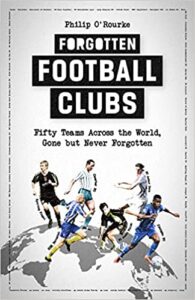 The fascinating stories of fifty lost football clubs from around the world, including their history, their successes and their ultimate failures.
The fascinating stories of fifty lost football clubs from around the world, including their history, their successes and their ultimate failures.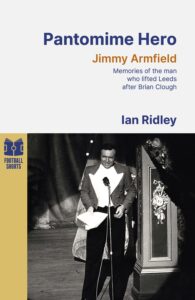 Jimmy Armfield was one of the great figures of English football – captain of the national team before Bobby Moore, member of the 1966 World Cup-winning squad, one-club man with Blackpool.
Jimmy Armfield was one of the great figures of English football – captain of the national team before Bobby Moore, member of the 1966 World Cup-winning squad, one-club man with Blackpool.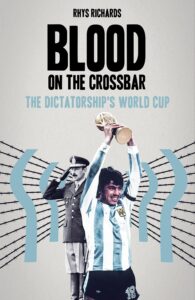 18 December 2022 – the Lusail Stadium. Lionel Messi receives the FIFA World Cup trophy after one of the most dramatic finals in the competitions history. This is Argentina’s, La Albiceleste (The White and Sky Blue), third triumph following wins in 1978 and 1986. However, for all the magnificence of the final, the first World Cup to be held in the Arab world has been a controversial one even from the point Qatar were awarded the event back in December 2010. Rumours circulated how votes had been ‘bought’ to ensure the tiny but incredibly wealthy state became hosts, with many around the globe pointing to Qatar’s human rights record as a significant and compelling reason for the country to be stripped of the 2022 event.
18 December 2022 – the Lusail Stadium. Lionel Messi receives the FIFA World Cup trophy after one of the most dramatic finals in the competitions history. This is Argentina’s, La Albiceleste (The White and Sky Blue), third triumph following wins in 1978 and 1986. However, for all the magnificence of the final, the first World Cup to be held in the Arab world has been a controversial one even from the point Qatar were awarded the event back in December 2010. Rumours circulated how votes had been ‘bought’ to ensure the tiny but incredibly wealthy state became hosts, with many around the globe pointing to Qatar’s human rights record as a significant and compelling reason for the country to be stripped of the 2022 event. Old school.
Old school. Hutch’s transfer to Coventry City and elevation to the First Division meant he was in the shop window for the Scottish selectors. That is when I, as a young spectator became aware of him – the 1974 World Cup. It was the first World Cup of which I was aware. Scotland’s manager, Willie Ormond has always been cast as the gentile figure, not seen by many as a giant of the Scottish game despite being the only Scottish manager to get us to a World Cup and come home unbeaten – although still, by Tommy Docherty’s standards, home before the postcards. I read these chapters with great interest. The names around Hutch’s debut are legends themselves, McGrain, Dalglish, Jordan, Hay, the Lawman… But it is the detail both of the campaign to get to the World Cup and whilst they were there that was of huge interest. Penny pinching blazers who put an international squad up in a halls of residence for a World Cup final friendly, cockeyed commercial deals, a wholly forgettable World Cup song, and being unable to deal with recalcitrant rowers as well as one man who saw his stature greater than his height – Billy Bremner – are all included, and I devoured them with eyes wide open.
Hutch’s transfer to Coventry City and elevation to the First Division meant he was in the shop window for the Scottish selectors. That is when I, as a young spectator became aware of him – the 1974 World Cup. It was the first World Cup of which I was aware. Scotland’s manager, Willie Ormond has always been cast as the gentile figure, not seen by many as a giant of the Scottish game despite being the only Scottish manager to get us to a World Cup and come home unbeaten – although still, by Tommy Docherty’s standards, home before the postcards. I read these chapters with great interest. The names around Hutch’s debut are legends themselves, McGrain, Dalglish, Jordan, Hay, the Lawman… But it is the detail both of the campaign to get to the World Cup and whilst they were there that was of huge interest. Penny pinching blazers who put an international squad up in a halls of residence for a World Cup final friendly, cockeyed commercial deals, a wholly forgettable World Cup song, and being unable to deal with recalcitrant rowers as well as one man who saw his stature greater than his height – Billy Bremner – are all included, and I devoured them with eyes wide open. When England’s Lionesses brought home the nation’s first major trophy in almost sixty years, they galvanised a nation. Fans new and old, male and female, got behind the team and women’s football reached new heights. It was a demonstration of all that is brilliant in sport and a celebration of equality and diversity at its finest. For many women, however, football hasn’t been, and isn’t always, a safe, welcoming and equal space. Incidents of sexism and misogyny have been all too often the experience of women in football, whether as players, employees or fans. And it was such undesirable experiences that led to two women making a stand.
When England’s Lionesses brought home the nation’s first major trophy in almost sixty years, they galvanised a nation. Fans new and old, male and female, got behind the team and women’s football reached new heights. It was a demonstration of all that is brilliant in sport and a celebration of equality and diversity at its finest. For many women, however, football hasn’t been, and isn’t always, a safe, welcoming and equal space. Incidents of sexism and misogyny have been all too often the experience of women in football, whether as players, employees or fans. And it was such undesirable experiences that led to two women making a stand. The gripping memoir and tell-all biography of Dennis Mortimer, including his decade at Villa and the team’s European Cup win.
The gripping memoir and tell-all biography of Dennis Mortimer, including his decade at Villa and the team’s European Cup win. Compelling, entertaining and refreshingly honest, One in a Million is the autobiography of Trevor Francis, the subject of the first £1 million transfer fee in football history – a record for all time.
Compelling, entertaining and refreshingly honest, One in a Million is the autobiography of Trevor Francis, the subject of the first £1 million transfer fee in football history – a record for all time.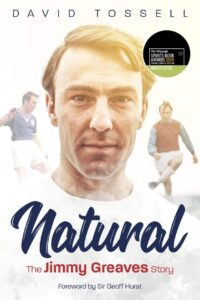 Jimmy Greaves remains the greatest goalscorer in English football history, with a record of 357 top-flight goals that may never be surpassed.
Jimmy Greaves remains the greatest goalscorer in English football history, with a record of 357 top-flight goals that may never be surpassed.